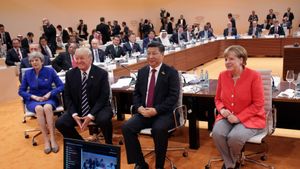Elon Musk's recent proposals aiming for substantial budget cuts have sent ripples through political circles, raising intriguing constitutional questions about government spending, oversight, and executive power. The tech mogul, famous for his ambitious visions at companies like Tesla and SpaceX, is now stepping onto the political stage, advocating for drastic reductions to federal budgets across various sectors, particularly those involving social services and environmental protections.
During his high-profile campaign, Musk has been vocal about rooting out what he calls "wasteful spending." He argues for reallocations intending to minimize government intervention and maximize what he believes are more innovative private sector solutions. His budget slashing proposals, inspired by his free-market approach, have drawn both enthusiastic supporters and fierce critics.
Accompanying Musk on this budget crusade is Vivek Ramaswamy, the entrepreneur and Republican presidential candidate whose own platform champions drastic cuts and sweeping deregulation. Ramaswamy's alignment with Musk emphasizes the blend of wealth, technology, and politics, creating a coalition that's as much about appealing to the base of the Republican Party as it is about practical governance.
Experts have raised eyebrows at their united front, noting potential constitutional conflicts. At the crux of the debate is whether the President can exercise unilateral control over budgetary constraints or if such powers are reserved for Congress alone. The U.S. Constitution provides Congress the responsibility of budget management, and any perceived overreach by the Executive branch could ignite significant legal battles.
A recent opinion piece from The Wall Street Journal examined this scenario, highlighting historical precedents where executive overreach collided with congressional authority. They mused whether Musk's push could trigger challenges akin to those faced during periods where executive power was tested, as seen during the New Deal era and modern testing of budgetary authorities under recent administrations.
Critics of Musk's proposals worry about the ramifications for already underfunded programs. For example, cuts to social services could exacerbate issues of poverty, education, and healthcare access, significantly impacting the most vulnerable sectors of society. While Musk touts potential savings, opponents argue these budget cuts might dismantle years of progress and worsen inequality.
Following Musk and Ramaswamy's proposals, several influential figures have voiced concerns. Democratic lawmakers have rallied against what they label as reckless disregard for constituents who rely on government assistance. Senator Elizabeth Warren expressed alarm over the potential erosion of safety nets, urging fellow lawmakers to resist any extreme measures aimed at slashing budgets without careful consideration of the consequences.
Even among Republicans, there’s skepticism about the sustainability of Musk’s vision. Some party members urge caution, arguing not all wasteful spending can be trimmed without harming legitimate government functions. Figures such as Senator Mitt Romney have suggested fostering bipartisan dialogues rather than pursuing radical cuts, stressing the importance of fiscal responsibility alongside humane policies.
At the grassroots level, public opinion seems divided. Polls indicate some voters resonate with Musk’s narrative of efficiency and innovation leading the charge for budget cuts; yet, many express apprehension about the potential fallout, particularly concerning social welfare programs. Town hall meetings across the country have morphed from discussions about innovation and economic growth to fiery debates about the appropriateness and ethics of cutting back government roles.
Musk’s stature as a billionaire entrepreneur who reshaped industries lends him both credibility and scrutiny. Supporters hail him as visionary, believing his disruption of traditional funding models could be beneficial, especially within the tech sector. Detractors, meanwhile, worry about potential overreach and neglect of the fundamental duties government owes to its citizens.
A significant concern among legal experts involves how these proposed cuts would affect existing treaties and obligations the U.S. has with other nations, particularly concerning environmental accords and human rights treaties. Critics argue unwinding government commitments could damage not just domestic infrastructure but also international relations.
Their approach, dubbed the "cut-to-the-chase method," claims to streamline government processes and redirect funds toward business growth. Yet, this raises another question: can private interests truly meet public needs without government oversight? Ramaswamy’s strategy of privatization, particularly concerning public education and healthcare, has drawn scrutiny as experts caution there are certain functions best kept within the public domain to safeguard equity and access.
The methodical rollback of budget allocations isn’t merely about numbers; it has the potential to represent broader political ideologies surrounding governmental roles and responsibilities. The possible clash over budgets may just be the tip of the iceberg, possibly leading to broader ideological battles over federal governance.
Both Musk and Ramaswamy are clear winners among functionally conservative segments of the electorate, with their shared philosophy initially capturing the attention of traditionalist Republicans. The long-term impact of their budget initiatives and the theories espoused may shape political dialogue well beyond the upcoming election period.
While Musk hopes to lead with innovative frameworks liberated from traditional bureaucracies, Ramaswamy backs up his ambitious goals with practical populism. Whether their combined strategies will withstand the scrutiny of institutional checks and balances remains to be seen. Nonetheless, the impending decisions made by Congress present opportunities for defining modern governance.
Looking forward, the dynamic between executive ambition and congressional authority could form the backdrop of U.S. politics for years to come. With Musk’s and Ramaswamy’s momentum, 2024 is likely to witness not only pivotal elections but also consequential debates about the role of government, shaping how future administrations might approach fiscal policy, budget management, and public welfare.



